Zoroastrian Lawmaker Offers Iranian History Lesson To IRGC Chief
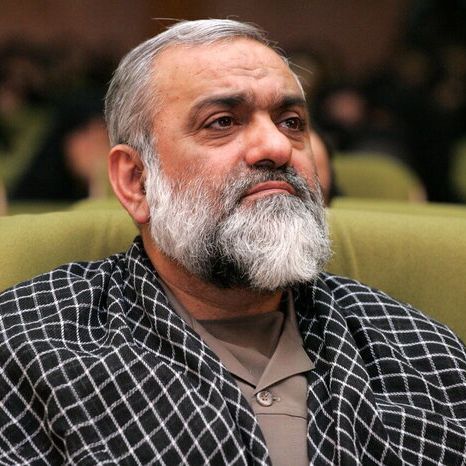
A Zoroastrians lawmaker in a letter has criticized an IRGC commander for disparaging remarks about pre-Islamic dynasties and offered him a brief history lesson.

A Zoroastrians lawmaker in a letter has criticized an IRGC commander for disparaging remarks about pre-Islamic dynasties and offered him a brief history lesson.
Mohammad-Reza Naghdi, the coordinating deputy of the Islamic Revolution Guard Corps (IRGC), had called the Achaemenid Dynasty (550-330 BCE) “filthy” in a speech Wednesday, accusing them of massacres and handing Iran “to the Greeks.” The Achaemenids fell to Macedonia’s Alexander the Great in the 4th century BCE.
Esfandiar Ekhtiari, who has since 2008 represented the small community of the ancient Iranian Zoroastrian faith, responded in a letter by extolling the Achaemenid ceremonial capital, which was declared a World Heritage Site in 1979: “What is seen in Persepolis reliefs are all indicative of purity and greatness.”
Naghdi had also attacked the Sassanid dynasty (242-264 CE) for handing Iran to the Mongols.
Ekhtiari pointed out that the Mongols over-ran Iran some centuries after the Sassanids were overthrown by Arabs adhering to the new religion of Islam shortly after the death of the Prophet Muhammed in 632 CE.
“Doubtless, there is no need to refer back to history to see who was ruling in Iran after the Sassanids, which definitely were not the Mongols,” Ekhtiari noted.
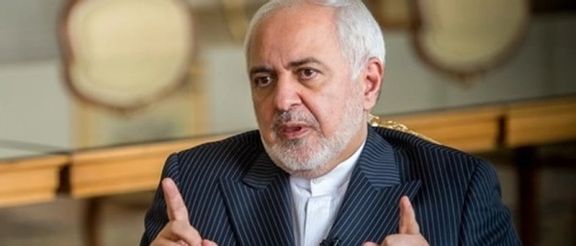
Former Foreign Minister Mohammad Javad Zarif is again under fire after conceding he unintentionally misled parliament over the text of Iran’s 2015 nuclear deal.
Speaking in a Clubhouse session Wednesday evening, Zarif admitted he had wrongly told parliament July 21, 2015 that the word ‘lift’ rather than ‘suspend’ had been consistently used in the wording of the agreement, the JCPOA (Joint Comprehensive Plan of Action) in relation to sanctions.
"The mistake was mine when I said the word 'suspend' does not appear in the JCPOA,” said Zarif, who was deeply involved in two years of negotiations leading to the 2015 agreement, which was abandoned by United States president Donald Trump in 2018 as he introduced ‘maximum pressure’ sanctions on Iran. Zarif was himself sanctioned by the US in 2019.
Following the Clubhouse session, hardliner critics took to social media to call Zarif a traitor. A hashtag demanding his prosecutionhas been set up.
Calls for prosecution
"Zarif's ignorance of the text of the nuclear agreement must be thoroughly investigated and those responsible [for including the word 'suspend'] must be prosecuted," said lawmaker Zohreh Elahian, who sits on parliament's National Security and Foreign Policy Committee, Wednesday.
Hossein Kanani-Moghadam, another hardliner, slammed Zarif for his ignorance: "A nation put its trust in Zarif … to defend the country's interests. How could he agree on a text the content of which, particularly sensitive terminology, he was not aware of?"
"For forty years the Islamic Republic's diplomacy has been in the hands of this group that is dependent [on Western powers],” tweeted Abdolreza Davari, ex-adviser to former principlist president Mahmoud Ahmadinejad. “They have caused nothing but damage…Zarif's friends for forty years stood alongside the enemy".
In Wednesday’s Clubhouse session, Zarif explained to the audience that the negotiation team had been ordered to avoid certain terminology, presumably including the word ‘suspend,’ but had agreed to the word due to a technicality regarding the European Union's position.
According to Zarif, while negotiating the text of one of the JCPOA appendices, the European representative had said that the EU could not 'lift' all its sanctions before UN sanctions were removed and therefore the word 'suspend' was used in some places. Zarif added that the Iranian negotiator had had not informed him of this – and the word appeared in the agreement as signed July 14.
‘This is a lie’
"The matter of suspension had nothing to do with the United States, it was related to the EU sanction … that were supposed to be lifted later," Zarif said in his defense. "But they [his critics] used this, and said Zarif had not read the text of the JCPOA…This is a lie, the Western [negotiators] will definitely tell you if you ask them."
Journalist Amir-Reza Nazari tweeted in defense of Zarifthat the JCPOA text was later scrutinized by parliament, the Supreme National Security Council, and the watchdog Guardian Council. "Why didn't they notice?" he asked.
Mojtaba Davoudi, a reformist activist, asked in a tweet if the use of 'suspend' instead of 'lift' in the JCPOA appendix had caused any real harm.
Opponents of the JCPOA attacked Zarif just as much as President Hassan Rouhani over the agreement, especially when the US imposed stringent sanctions in 2018.
Zarif was in May reprimanded by Supreme Leader Ali Khamenei after leaked audio revealed him criticizing the role of former Qods Force Commander Qasem Soleimani in Iranian diplomacy. Already a principlist hero for organizing resistance to the Islamic State group (Isis-Daesh) in Iraq, Soleimani was killed by a US drone strike in Baghdad in January 2020.
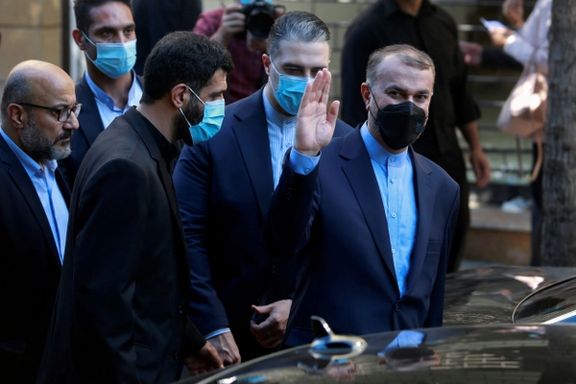
Talks to improve relations between Iran and Saudi Arabia have gone a "good distance", Iran's Foreign Minister told a news conference in Beirut on Thursday.
Hossein Amir-Abdollahian is visiting Lebanon where he promised help to the economically ravaged country.
Iran and Saudi Arabia, the leading Shi'ite and Sunni Muslim powers in the Middle East, have been rivals for years, backing allies fighting proxy wars in Yemen, Syria and elsewhere. They cut diplomatic ties in 2016. Saudi Foreign Minister Prince Faisal bin Farhan confirmed on Sunday that his government had held its first round of direct talks with Iran's new government last month, part of a process begun earlier this year to reduce tensions.
Three rounds of Saudi-Iranian talks were held in Iraq in the months before Iran's new hardline president, Ebrahim Raisi, took office in August.
Prince Faisal said the latest round had taken place on September 21 but did not say where.
The United States and its European and Middle Eastern allies have called on Iran to change its policy of interference in regional countries as part of ongoing nuclear talks with Tehran.
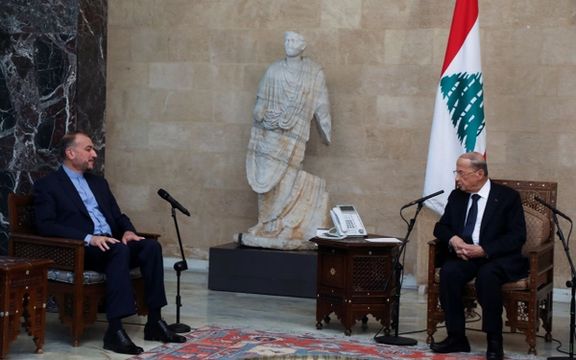
Iran's Hossein Amir-Abdollahian told President Michel Aoun in Beirut Thursday that Tehran would offer any help required by Lebanon, which faces multiple crises.
News agencies of the two countries have so far reported few details of the meeting between Iran’s foreign minister and the president, who leads the mainly-Christian Free Patriotic Movement allied to Hezbollah.
On arrival at Beirut airport Thursday after wrapping up a two-day visit to Moscow, Amir-Abollahian told Iranian state television (IRIB) that Tehran Iran had "better and newer propositions for breaking Lebanon's economic siege."
He said his trip was “indicative of deep and friendly ties between the two countries, and we support Lebanon’s army, people, and resistance with a strong voice.”
The Iranian foreign minister also met with parliament speaker Nabih Berri, leader of the mainly Shia Amal party, and is scheduled to meet Prime Minister Najib Mikati, Foreign Minister Abdullah Bou Habib, and representatives of Palestinian groups.
On Monday Hezbollah Secretary-General Hassan Nasrallah said third and fourth consignments of fuel were on their way to Lebanon.
“Paperwork has been done for the dispatch of the third gasoline-laden ship from Iran,” he said in a speech. “The fourth ship will bear diesel and will be sent over subsequently.”
Lebanon faces chronic shortages of petrol and diesel – the latter used for electricity generation by hospitals, apartments and other buildings – as the Lebanese pound has collapsed against the dollar, plunging around 80 percent of the population into poverty.
The United States has been enforcing sanctions against Lebanon for more than a year to pressure the country to curb political and military influence of Hezbollah, which is well represented in the Lebanese parliament and allied to Tehran. These sanctions have compounded the country’s economic problems.
Iranian officials say fuel bound for Lebanon was purchased by Lebanese Shiite merchants but have not explained how payment – which would contravene US sanctions against Iran – might be made. Vessels from Iran deliver the fuel to Syria from where it is delivered to Lebanon by trucks.
A third tanker carrying fuel arrived in the Syrian port city of Baniyas Wednesday. The first convoy of fuel trucks entered Lebanon on September 16. It is not clear how much of the fuel has been transported to Lebanon by land so far for which thousands of trips are required.
On Tuesday Shabab Hezbollah, a pro-Hezbollah social media Twitter account, reported that a convoy of around 60 trucks, the tenth such convoy, had entered Lebanon from Syria.
The initiative, which Hezbollah said had broken an "American siege" irritated some factions in Lebanon that said the party had not sought the government's approval for importing fuel from Iran. Hezbollah's opponents accused the group of undermining state authority and exposing Lebanon to the risk of further US sanctions.
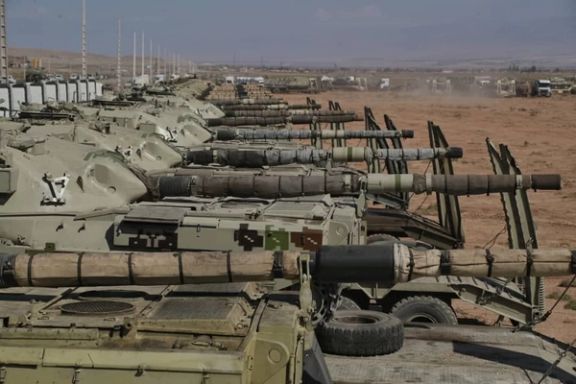
The ideology chief of the Revolutionary Guard has said that Iran will not allow “Takfiris or Zionist terrorists” to create a “nest” at its northwestern borders.
In recent weeks tensions have increased between the Islamic Republic and its northern neighbor Azerbaijan, with Iran accusing Baku of harboring Israeli and jihadist elements on its territory and attempting to change borders at the expense of Armenia.
General Rasul Sanaeirad, who is a deputy commander of the Islamic Revolution Guard Corps (IRGC) in charge of ideology said that Iran has been careful not to instigate conflicts and tensions over the years, but it had to conduct military drills last week to send a message.
Iran massed large number of troops and weapons near the Azerbaijani borders and held drills, citing exercises by Azerbaijan, Turkey and Pakistan near its borders.
Sanaeirad added that the military drills also send a message to “powers behind the scenes” who were instigating tensions. He did not name those countries.
He added, “Iran opposes any kind of geopolitical changes in the region and regards as important the security, territorial integrity and the rights of its neighbors.”
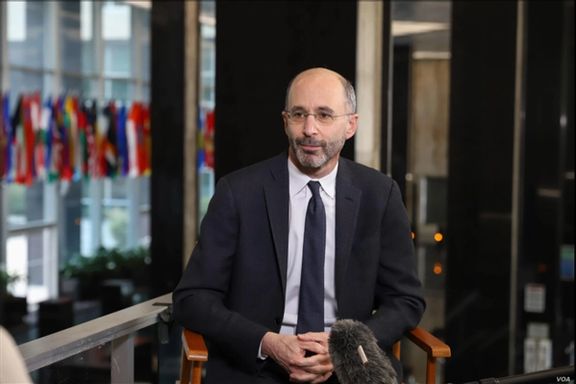
US Special Envoy for Iran held spoke Thursday with a South Korean diplomat to discuss cooperation over negotiations to restore the 2015 Iran nuclear deal.
The South Korean news agency Yonhap issued a brief report on Robert Malley’s discussion with First Vice Foreign Minister Choi Jong-Kun but provided no details about how South Korea can help in the process of talks with Tehran.
Two South Korean banks hold $7 billion of Iran’s funds from the time when Seoul was purchasing oil from Tehran before full US sanctions on Iran’s crude exports were imposed in May 2019.
Iran has been hinting that the United States should release frozen Iranian funds before it returns to the talks. Iran’s Foreign Minister Hossein Amir-Abdollahian told Iranian state television on October 2 that he refused overtures to meet with US officials while he was attending the UN General Assembly in New York in September, asking that Washington should first unfreeze $10 billion.
It is not clear if Malley’s conversation with the South Korean diplomat was related to the issue of the frozen funds, or whether the US intends to release them to convince Iran to return to the Vienna negotiations. Malley asked for South Korea to play a “constructive” role in efforts to resume the negotiations.
However, Choi reiterated South Korea’s willingness to provide support necessary for the resumption of the nuclear talks "in consideration of the importance of Seoul-Tehran relations,” Yonhap quoted the foreign ministry as saying.
Iran left the Vienna multilateral nuclear talks aimed at restoring the 2015 nuclear deal, JCPOA, in June, saying its new president needed time to form a government, but has so far not set a date for its return.
The United States, the United Kingdom, France and Germany that have been negotiating with Iran since April have warned that time is running out for fruitful talks as Iran continues to enrich uranium and advances its nuclear program that would make the revival of the agreement impossible.
Washington and its European allies have said they will make no new concession to Tehran until it returns to the talks based on what has so far been offered by the West.